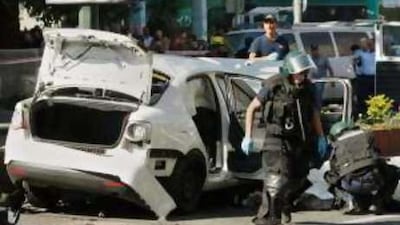TEL AVIV // A car bomb assassination of a powerful crime family boss has sparked fears of an all-out mob war in Israel. In the most high-profile slaying of a top mobster in recent years, Yaakov Alperon was killed on Monday when a bomb exploded under his rental Volkswagen on a busy Tel Aviv intersection. Israeli television broadcast footage of Mr Alperon's bloodied body slumped out of the door of his car, which had erupted in flames. Witnesses described a huge explosion that shook the ground. The attack lightly injured two 13-year-old schoolboys sitting in a nearby bus stop and a 39-year-old man driving in an adjacent lane.
"An extremely serious event took place today [Monday], and its consequences are completely clear to us," Ilan Franco, the Tel Aviv police commander, told journalists at the scene. "It likely happened because of an internal conflict within the Tel Aviv crime world." Israelis were captivated by the assassination, the latest in a string of mob turf battles that have claimed the lives of dozens of gangsters in recent years. Israelis, who typically view violence from their Palestinian neighbours as the main threat to their security, are unused to having their public safety jeopardised by gangs settling their scores on the streets of major cities.
Yesterday, Mr Alperon's killing dominated the airwaves and newspapers, overshadowing Palestinian rocket barrages from the Gaza Strip and the unravelling of a five-month-old ceasefire with Hamas militants. "Revenge Alert," blared the front-page headline of the mass-circulation Maariv newspaper, while the top headline of the Israel Hayom daily - citing police concern - screamed, "War of Assassinations". Israel's increasingly violent underworld is also leaving innocent bystanders as victims. In one of the most striking cases, a 31-year-old woman enjoying a summer evening with her family on a beach in July was killed in front of her two children as she was mistakenly shot in the chest by a motorcyclist who intended to shoot at a group of gangsters sitting nearby.
Mr Alperon, 54, was a well-known figure in Israel. He and his brothers - one is a member of the right-wing Likud party's central committee - have not shied away from television interviews and his immediate family even took part in a reality television show. Crime experts said Mr Alperon's parents emigrated from Egypt in 1947 and raised 12 children in a two-and-a-half room apartment in central Israel. After the eldest son was killed in combat while in the army, Mr Alperon dropped out of school to help support the family and eventually drifted into crime. He burst on to the Tel Aviv mob scene in the mid 1970s, when he was charged with involvement in the murder of a nightclub owner who had accused him of extortion, Israeli media reported.
Before he was killed, Mr Alperon, a father of seven, was on his way home from a Tel Aviv district court where his 20-year-old son was facing charges of extortion. Journalists there said Mr Alperon, who was wearing a white polo shirt with thin black stripes, a black hat and dark sunglasses, cracked jokes with those around him and tried to calm his wife, who was upset after the court ruled that their son would stay in jail for another 10 days. Yesterday, the son, Dror Alperon, was granted temporary release from custody to attend his father's funeral accompanied by police. Thousands of relatives and friends arrived at the cemetery on the outskirts of Tel Aviv, including some well-known underworld figures. Some experts said Mr Alperon, despite being repeatedly warned in the past year by police about assassination plots against him, took fewer safety precautions in recent months. While he would typically travel with several bodyguards, on Monday he was alone in his car. Shai Nudel, a lawyer representing the Alperon family, told Israel Radio that his client "probably thought he didn't need to be cautious". Police have not released any details on possible suspects, but speculation was rife in the local media. Some reports said Mr Alperon was battling with the Abutbul and Abarjil families over the lucrative bottle recycling business that is worth about 200 million shekels (Dh186.9) a year. Haaretz reported that Amir Mulner, the head of another crime group, is also a suspect by police. The paper said Alperon and Mulner family members fought with guns and knives during a meeting called to settle a turf war in Jan 2006, during which Mr Mulner was stabbed in the neck by Mr Alperon's son. Another enemy was convicted drug lord Zeev Rosenstein, who himself has survived at least seven assassination attempts. Mr Alperon's killing prompted criticism of the Tel Aviv police. The commentator Natan Zahavi wrote in Maariv: "The fact that these assassinations happen in broad daylight in city centres is proof that someone failed, big time." Tzipi Livni, the head of the ruling Kadima party and a leading candidate for the premiership in the forthcoming February elections, mentioned the assassination during a party meeting, after speaking about the rocket barrages fired from Gaza. She said: "As far as we are concerned, it is just as important to go after criminal gangs as it is to go after foreign threats." But some observers said the police simply did not have the budget and resources needed to chase down mobsters in what many fear will now become a fierce gangster war. On Tuesday, Mr Alperon's nephew told Army Radio his uncle's murderer would be punished. "If he is not punished from above, he'll be punished by other means," Ronen Salameh said. vbekker@thenational.ae

